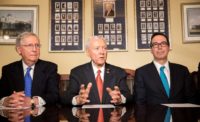
No one can say Sen. Carl Levin has gone after small fry in investigating U.S. companies' overseas tax policies. The Michigan Democrat has held a series of hearings focusing on Apple, Microsoft and Hewlett-Packard and now has turned his attention to heavy-equipment giant Caterpillar Inc.
The Senate Homeland Security Committee's permanent subcommittee on investigations, which Levin chairs, issued a report on March 31 stating that, from 2000 through 2012, Caterpillar allocated more than $8 billion in non-U.S. profits to a Swiss unit and deferred paying $2.4 billion in U.S. taxes on those earnings.
The next day, Levin followed up by grilling officials from Caterpillar and its tax adviser, PricewaterhouseCoopers LLP (PwC), about the Swiss tax arrangement at a lengthy hearing of the panel.
Caterpillar and PwC witnesses defended their actions and the tax strategy, saying they complied with the tax code and related case law.
The report and hearing drew substantial media coverage, and Levin's questions and comments sometimes became pointed and heated. But the upshot of the subcommittee's probe and hearing is unclear.
Will Levin follow up with further action related to Caterpillar's or other companies' overseas taxes? Gordon Trowbridge, a Levin spokesman, says the subcommittee "doesn't discuss ongoing investigations or further hearings until they're scheduled." The panel also doesn't discuss requests it might send asking federal agencies to look into various issues, he adds.
Meanwhile, the 79-year-old Levin's Senate tenure is drawing to a close. He announced in March 2013 that he would not seek reelection this year.
Other senators on the subcommittee said the Caterpillar example shows the need for overhauling the U.S. tax code. Some noted that the 35% U.S. corporate rate is the highest among major developed countries. But Congress almost certainly won't pass a broad-based tax reform measure this year.
Levin said he, too, supports tax reform but has a more focused aim: closing the "loophole" for overseas tax transfers like Caterpillar's. He introduced a bill in February 2013 that, among other provisions, would change the rules for overseas taxes, but it has yet to advance.
The Obama administration and House Ways and Means Committee Chairman Dave Camp (R-Mich.) have pointed to tax revenue from repatriating U.S. firms' foreign income as a way to fortify the ailing Highway Trust Fund. Without new money, the fund's highway account is projected to show a deficit as early as this summer. That could prompt states to put new projects on hold.
Jay Hansen, National Asphalt Pavement Association executive vice president, says his group is seeking an easy-to-implement, consistent revenue source to bolster the trust fund. "And I don't know if repatriating tax dollars back to the United States does that," he says. "Is it a one-time 'fill the coffers,' or is that steady revenue over multiple years?"





